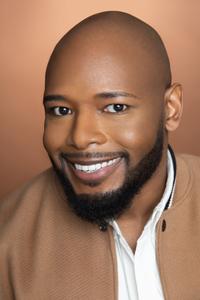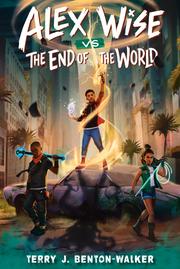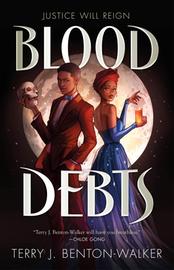
|
|
| photo: Derek Blanks/ crowdMGMT | |
Terry J. Benton-Walker is a queer Black author of young adult and middle-grade speculative fiction. His debut novel, Blood Debts (Tor Teen, $18.99), is a national bestseller, and his middle-grade novel, Alex Wise vs. the End of the World (Labyrinth Road, $18.99) is out now. He grew up in rural Georgia, and he lives in Atlanta with his husband and son. Shelf Awareness spoke with Benton-Walker about parenting, self-love, and Black and queer representation in his novels.
Let's get into Alex Wise vs. the End of the World first. Alex's primary power is the Sense, a sort of super empathy. What motivated this choice?
I wrote Alex Wise at a point in my life where I had done a lot of introspection and a lot of therapy, looking at past traumas and things that I'd gone through that inform the person I am today. One thing I noticed is that, despite everything, I maintained my ability to empathize with people, even when I wasn't as kind to myself. And the thing that I've come to learn is that empathy, even in our world, is a superpower. Being able to connect with someone else emotionally and feel for them and understand their past and what they're going through is a part of our larger purpose: to connect and build community. We cannot do that without empathy.
 In Alex Wise, there's this theme of betrayal, and it has a pronounced impact on Alex's story. Why did you choose to have betrayal play such a significant role?
In Alex Wise, there's this theme of betrayal, and it has a pronounced impact on Alex's story. Why did you choose to have betrayal play such a significant role?
For Alex, the betrayal plot line was important because it's really important to have a strong support system around you, people whom you can depend on and who help you navigate this very confusing time. In a way, when we have to deal with such massive betrayals from the people we love and trust, that shapes how we view ourselves and how we view our place in the world. It was important for Alex to find a way past that betrayal, and to love himself instead of feeling devalued or less than.
One of Alex's primary battles is to fight against this constant thought that he's unworthy, and this is prompted in part by Alex's father's refusal to accept his sexuality. What inspired you to write about self-love and self-acceptance?
This story is very personal. I pulled a lot of personal experiences and emotional traumas and put them into the story because it is my hope that kids--especially Black, queer kids--see themselves represented and understand they have value, and they are worthy of taking space and existing just as they are. Hopefully it won't take them 37 years to love themselves, the way that it did me.
 In both Alex Wise and Blood Debts characters experience familial trauma. For Alex, the trauma is more immediate, but in Blood Debts the trauma is generational. What were some of the experiences you had writing characters who were navigating these two different types of familial trauma?
In both Alex Wise and Blood Debts characters experience familial trauma. For Alex, the trauma is more immediate, but in Blood Debts the trauma is generational. What were some of the experiences you had writing characters who were navigating these two different types of familial trauma?
Generational trauma is much more complex to explore and break down, and there are a lot more complex emotions surrounding it. I wrote Blood Debts during a time in my life when I was really, really angry. Intergenerational trauma, systemic oppression, and the cycle of violence were things that I wanted to explore, but I felt like I needed a more mature landscape to be able to do that. The young adult characters and the young adult world provided that for me.
Alternatively, with Alex Wise, I wasn't angry when I was writing that book. I was actually sad a lot when I was writing that book. I had a lot of stuff going on in my life and in the world. And then I was dredging up all that old trauma to create Alex's character. Alex Wise is also really about Alex's personal journey and his internal struggle.
In both books, there are intimate sibling relationships. Is this pairing of characters something that's purely narrative, or does this come from your personal experience?
In Blood Debts, that sibling relationship was purely narrative. And I kind of wrote that from a place of hope and imagination. My siblings and I were always at drastically different life stages, and we never got a chance to be super close until adulthood. So, when I wrote Blood Debts, I made Cris and Clem 16-year-old twins and I got to explore a world of siblinghood that I had never had in real life.
With Alex Wise, that relationship between him and his sister is more reflective of my relationship with my own brother and sister. Like Alex, my mom and dad divorced when I was 13. As a result of that, I had to take a lot of responsibility looking after my brother. It was very taxing and it kind of altered our sibling relationship--instead of being a brother, I became a bit of a surrogate parent. A lot of the experience I had with my brother informed Alex's relationship with his sister.
That leads perfectly into the next thing I wanted to talk about: maternal sacrifice. In both books, there's the traumatic death of a mother. What motivated you to work with this concept?
I would say it was a combination of my experiences growing up with my mom as well as my own experiences as a parent. Growing up I knew that my mom would do anything for us. She struggled, but I knew that she was always doing the best that she could to take care of us. Being a parent, I have come to really understand my mom and the sacrifices she made for us. When I was writing the perspectives of these women who were willing to sacrifice their own lives to ensure their families' safety, it came from a very personal place.
I'm sure your own experience as a parent adds a lot of complexity to your writing.
Totally! In each story there is no perfect example of a parent. There are some parents who are much better than others, but there's no perfect example. Even the ones who are the best of the bunch have their problems. I think that's the thing I've come to respect more as an adult: me and my husband have come to realize that we're not perfect and that that's okay. We have to give ourselves grace.
You mention that you're specifically writing for Black audiences and even more specifically for people who are young, Black and queer. What message are you hoping to share with this community and how do you envision your work impacting their lives?
I want Black, queer kids to see themselves centered in epic fantasy and horror. I want us to be able to see ourselves represented across all the genres and subgenres but, specifically for me, in high fantasy and horror. Many people have spent so long absorbing content and interacting with media and characters that we would like to relate to. I hope to create stories that Black queer teens can see themselves in and relate to. I've really put a piece of myself into each one of those stories and it's usually centered around a very hard-learned lesson that I'm hoping no one else has to repeat. I'm hoping that they can feel inspired by these stories. --Cade Williams

